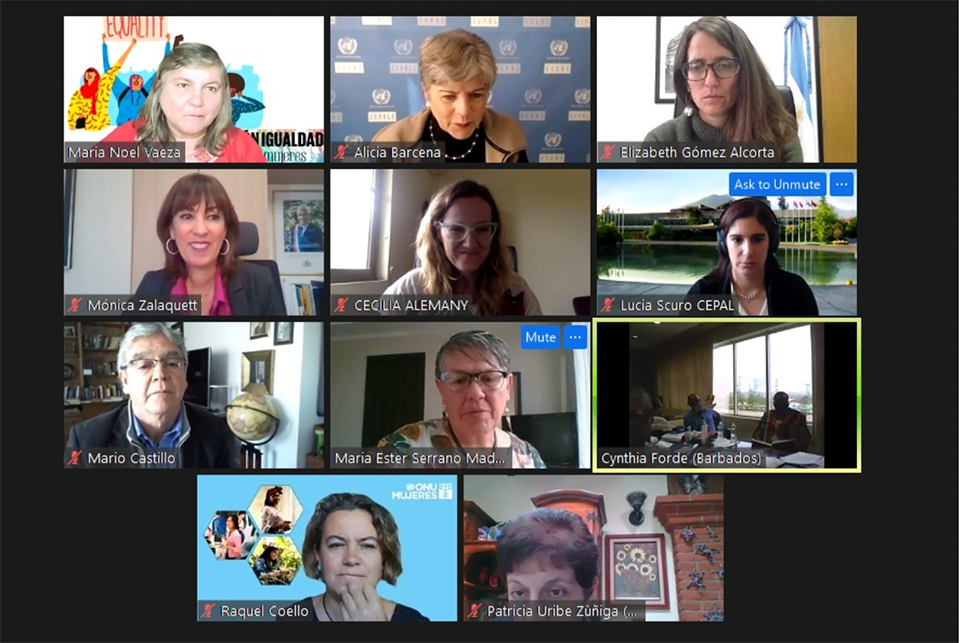ECLAC and UN Women launch joint paper on "Care in Latin America and the Caribbean at the time of COVID-19. Towards Comprehensive Systems to Strengthen Response and Recovery"
Date:

On August 19, the Regional Office for the Americas and the Caribbean of UN Women and the Economic Commission for Latin America (ECLAC) launched online the publication of the Policy Brief Care in Latin America and the Caribbean during the COVID-19. Towards Comprehensive Systems to Strengthen Response and Recovery with the participation Ministers of Women from across Latin America and the Caribbean.
This document highlights the impacts that the current health crisis is having on Care, highlighting some measures that are already being implemented within the framework of the response to COVID-19 in some countries in the region.
The document and event on recommendations for integrating Care into response as a key element of socio-economic recovery.
The aim of the event was to encourage discussion and analysis on the measures and good practices that have been adopted on care in Latin America and the Caribbean, in addition to analyzing the relevance of Care Systems in the region and their fundamental contribution to the exit strategies of the COVID-19 crisis.
The launch was attended by Ministers and Senior Authorities of national mechanisms for the advancement of women and the Ministries of Social Development and representatives of Argentina, Barbados, Chile, Costa Rica, Ecuador, El Salvador, Guatemala, Honduras, Cayman Islands, Mexico, Nicaragua, Paraguay, Peru, Saint Lucia, Uruguay and Venezuela, among other countries. In addition to the 500 attendees present at the Zoom platform, the event was followed through Facebook Live of the UN Women regional page reaching 30,000 people and generating 2,396 interactions and more than 8,800 views.
The document was presented by the Executive Secretary of ECLAC, Alicia Bárcena, and the Regional Director for the Americas and the Caribbean of UN Women, Maria Noel Vaeza. Alicia Bárcena highlighted that the care economy is key to a sustainable economic recovery, being fundamental to target investment resources in this area. Also noted the Santiago Commitment as a guide to promote strategies for mitigation and economic recovery from a gender perspective at the regional level. María Noel Vaeza stressed the urgency of acting, breaking the vicious circle of inequality, precariousness, exclusion and poverty, which leads to invisibility and poor distribution of Care. According to the regional director of UN Women, "the Care issue is here to stay, and it is crucial that governments consider its importance. Otherwise this crisis may leave many women out of the economy and unable to exercise their economic and social rights".
The presentation was followed by a panel on Care in the region "Measures, good practices, progress and challenges". Moderated by Mónica Zalaquett, Minister of Women and Gender Equity of the Republic of Chile and President of the Board of directors of the Regional Conference on Women in Latin America and the Caribbean. The panel was first attended by the Vice President of the Republic of Costa Rica, Epsy Campbell, who spoke about the National Network of Child Care and Development in the country. During the pandemic, Costa Rica has maintained the health care network, focusing on support measures for lower and lower middle classes of women.
Afterwards, the Minister of Gender and Diversity of Argentina, Elizabeth Gómez Alcorta, addressed the different care measures that the country has adopted during the COVID-19 crisis and the recent approval of an agreement with the Ministry of Public Works to boost the construction of the care infrastructure.
After both interventions, high-level representatives of the countries of the region, such as Mexico, Nicaragua, Costa Rica and Barbados, took the floor to make their contributions and show the measures implemented in their countries to advance the issue.
The entire recording of the event can be found in the following link.